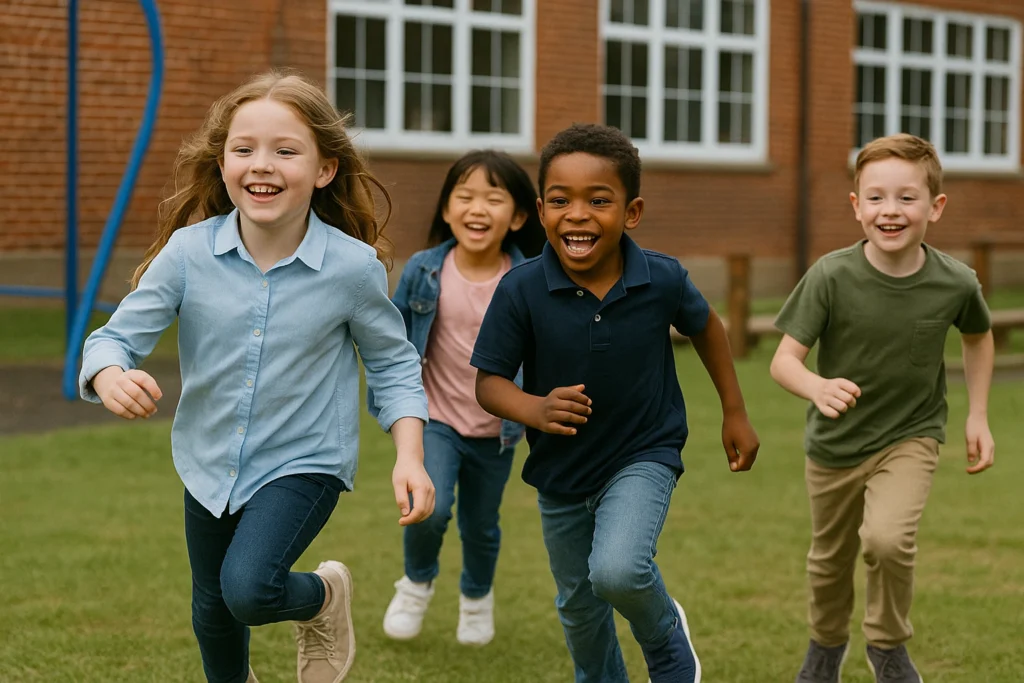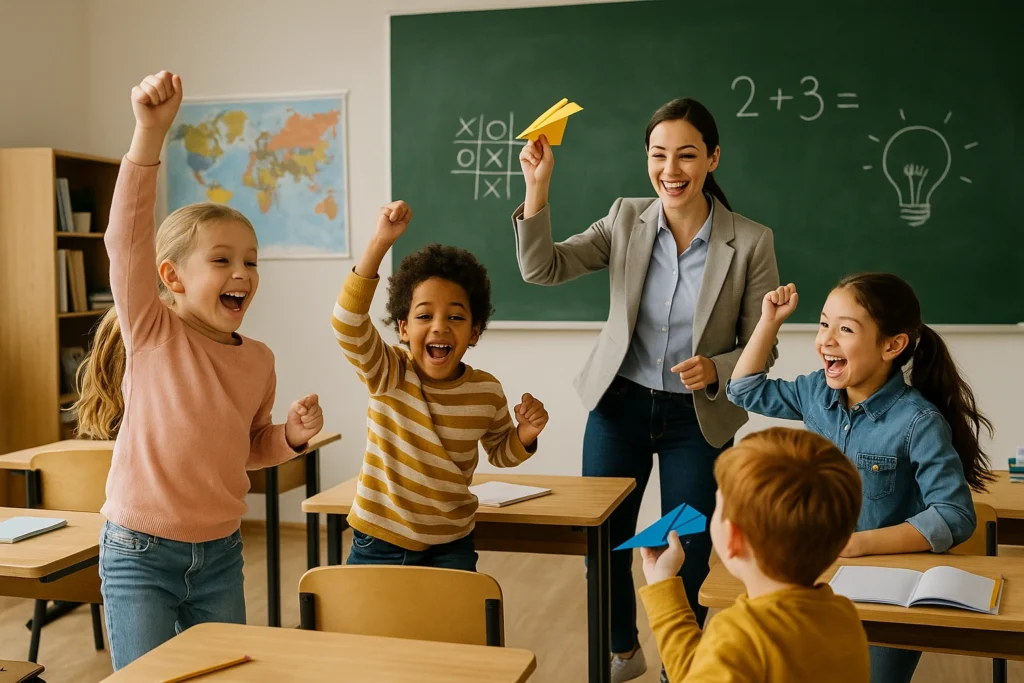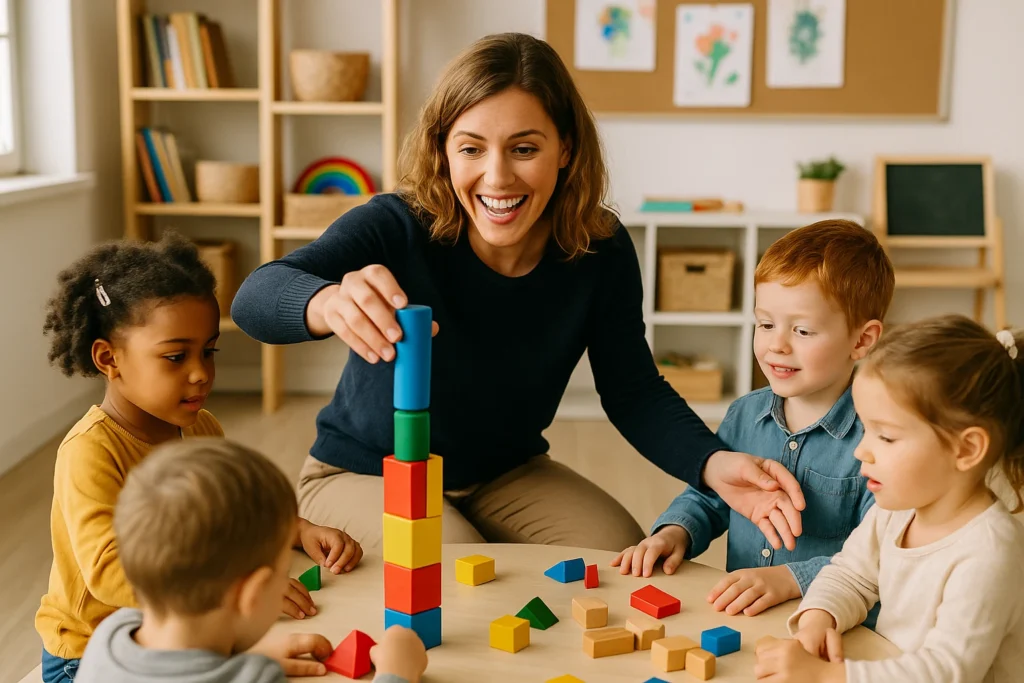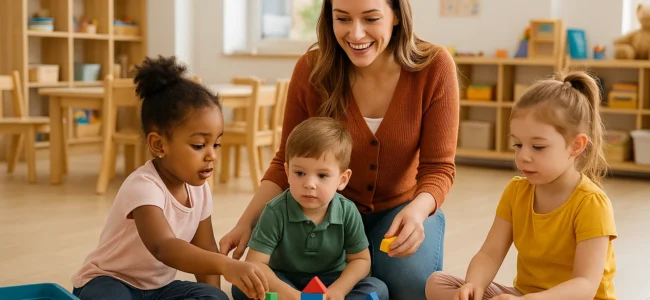Most teachers face constant pressure to choose between play and academic rigour in early childhood education. Meanwhile, parents worry that their child will fall behind if allowed to play. To be honest, it’s all about using the right early education strategies. Many don’t know this, but play-based learning truly accelerates how children develop fundamental skills.
This guide breaks down exactly why play delivers better educational outcomes. We’ll cover:
- How play supports brain development in early years
- Watch children build social skills through group activities
- Simple ways to add play into your daily lessons
- Stories from Australian teachers who made the switch
- Quick methods for tracking student progress
To be clear, play enhances brain structure and function better than traditional methods. That’s exactly why Australia’s national education framework prioritises this approach.
Let’s break down everything about what makes play such a powerful learning tool.
Play-Based Learning in Early Childhood
Different types of play serve different purposes in your classroom. When you know which approach to use, children learn more effectively and stay engaged longer.
Let’s explore the main components that make play-based learning work:
Free Play vs Guided Activities
Free play lets children control everything about their experience. They decide what to do, how long to do it, and who joins them. There’s no pressure to learn anything specific. In this approach, children simply choose games and activities that interest them.
On the other hand, guided activities work differently. For example, they keep that same child-directed spirit but add gentle teacher support toward learning goals.
The beauty is that both approaches have their place in your daily routine.
Age-Appropriate Play for Different Early Years
Every age group needs different types of activities to support their development. Let’s take a three-year-old. They love turn-taking games and imaginary play using dolls or household items.
For example, a simple game of “restaurant” with toy food helps them practice social skills while building vocabulary naturally. Then again, older children can handle more complex puzzles and cooperative games that require following rules.
Basically, the only way you can succeed with this approach is by matching activities to where children are developmentally.
Creating the Right Environment for Children’s Play
Your room setup should invite exploration and choice at every turn. We suggest you consider having separate areas for building, art, books, and dramatic play. After all, each space needs materials that children can use independently.
You’ll also want room for both quiet individual work and active group activities. As a parent or a teacher, you should try rotating toys weekly. This technique will keep the child’s interest high and prevent him/her from getting bored with the same options.
Now you understand the basics, but how do these approaches help children develop important skills?
The Life-Changing Benefits of Play in School Settings

When children engage in play, remarkable changes happen across every area of their development. Remember, the benefits extend far beyond simple enjoyment and touch on skills they’ll need throughout their lives.
Check out what research reveals about the powerful impact of play:
- Emotional Growth: Watch a child whose block tower falls, then see them take a deep breath and rebuild it. The message is that play naturally teaches resilience while helping children understand their feelings. The same approach works when they use pretend scenarios to work through difficult emotions safely.
- Social Development: Group play forces children to share crayons, take turns on swings, and work together toward common goals. Through the process, they learn empathy by stepping into different characters’ shoes. Also, the imaginative play sessions become practice grounds for real-life social situations.
- Problem-Solving Skills: Building challenges and obstacle courses present real puzzles that need creative solutions. In such scenarios, children try one approach first, then observe what happens next. That’s when the feedback helps them modify their strategy based on what the experience taught them.
- Communication Abilities: Playing with friends requires clear explanations, active listening, and finding the right words for complex ideas. As conversations flow, children’s vocabulary grows naturally. Plus, the game negotiations and story creation provide meaningful practice for language development.
- Executive Function: Self-directed play activities demand planning, sustained attention, and impulse control from young minds. Over time, the cognitive workout strengthens mental muscles over time. These same skills directly transfer to classroom learning and homework completion later.
Research from the National Association for the Education of Young Children (NAEYC) shows that children who experience quality play develop stronger social connections and demonstrate better emotional control in classroom settings. The difference becomes obvious when you compare them to children with limited play opportunities.
But knowing the benefits only gets you halfway there. Your students are waiting for you to put this knowledge into action.
Proven Early Education Strategies for Your Classroom

You know play works, but how do you make it happen in your actual classroom? The real challenge arises when trying to fit playful learning into packed schedules and curriculum requirements.
Start small and build from there. Adding a few playful touches to lessons you already teach creates meaningful change. Your confidence grows as you see children respond positively to the new approach.
Learning Stations That Spark Natural Curiosity
Interesting materials naturally draw children in for hands-on exploration. When you add shells, magnifying glasses, and smooth rocks to your science corner, the space becomes a magnet for young learners.
Plus, the writing centre changes when you add fun stamps, colourful pens, and textured paper. What draws children to these spaces is how they promise discovery rather than demanding exact performance.
Games Instead of Worksheets
Card matching teaches the same recognition skills as flash cards, but keeps children engaged much longer. What’s interesting is how children perceive the activity differently. Building activities strengthen spatial thinking while feeling like pure play to young minds.
And here’s the thing, board games naturally cover counting, turn-taking, and strategy without announcing themselves as formal math lessons.
Academic Content Through Role-Playing
Restaurant scenarios teach money math, menu reading, and customer service all in one activity. The cool part is how seamlessly academic concepts blend with imaginative play.
For example, when you set up a pretend post office, children get chances to practice writing addresses and sorting mail. On top of that, the scenario develops polite conversation skills through natural interaction.
Daily Choice Time for Independence
Freedom to select activities from prepared options develops decision-making abilities and reveals personal interests. You’ll notice how some children gravitate toward building materials while others prefer art supplies or quiet book corners.
What’s fascinating is how the observation process helps you discover individual learning styles. Simply watch how different children approach the same area of your classroom and you’ll see their unique patterns emerge.
These strategies work because they honour how children naturally learn while meeting educational objectives. The magic happens when play and learning become indistinguishable.
Bringing Play Into Your Daily Teaching Practice

Implementation brings real challenges that no theory fully prepares you for. Every teacher faces obstacles when moving from worksheets to play-centred learning.
- Time Management: Your main concern becomes fitting everything into the schedule. Here’s the thing, though, integration works better than separation. After all, children naturally learn writing through restaurant role-play while also mastering math concepts through cooking activities.
- Assessment Methods: Unfortunately, documentation replaces traditional testing when children learn through hands-on exploration. For instance, take photos of block structures to reveal spatial thinking. The evidence will provide different but equally valuable proof of progress.
- Age-Appropriate Approaches: Different age groups benefit equally from play but require varied strategies. Let’s take Preschoolers, they love dramatic play scenarios. On the contrary, school-age children excel at board games that teach strategy.
Your confidence grows as children respond well to playful approaches and show genuine engagement with learning.
Building Tomorrow’s Learners Through Play Today
The skills children develop through meaningful play become the foundation for everything they achieve later. Also, thanks to these innovative interventions, these children grow into adults who solve problems creatively and bounce back from tough situations. They become natural team players who communicate well and lead with kindness.
At Francis Orr, we connect you with teachers who believe in play-based methods and schools that share this vision. We know how early childhood experiences shape future leaders, thus we help teachers find places where their skills are truly valued.
Always remember this: your work in play-based education touches countless lives. The children you teach today become tomorrow’s problem-solvers and caring leaders who make positive changes in their communities.
So, contact us today and participate in creating a caring leader!

